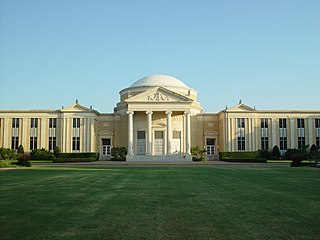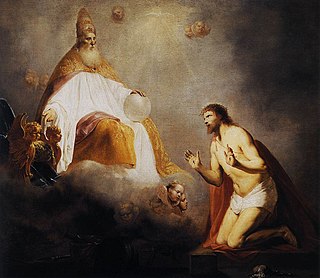
Calvinism is a major branch of Protestantism that follows the theological tradition and forms of Christian practice set down by John Calvin and other Reformation-era theologians. It emphasizes the sovereignty of God and the authority of the Bible.
Theology is the systematic study of the nature of the divine and, more broadly, of religious belief. It is taught as an academic discipline, typically in universities and seminaries. It occupies itself with the unique content of analyzing the supernatural, but also deals with religious epistemology, asks and seeks to answer the question of revelation. Revelation pertains to the acceptance of God, gods, or deities, as not only transcendent or above the natural world, but also willing and able to interact with the natural world and, in particular, to reveal themselves to humankind. While theology has turned into a secular field, religious adherents still consider theology to be a discipline that helps them live and understand concepts such as life and love and that helps them lead lives of obedience to the deities they follow or worship.

Liberation theology is a Christian theological approach emphasizing the liberation of the oppressed. In certain contexts, it engages socio-economic analyses, with "social concern for the poor and political liberation for oppressed peoples". In other contexts, it addresses other forms of inequality, such as race or caste.
Ashʿarism or Ashʿarī theology is one of the main Sunnī schools of Islamic theology, founded by the Arab Muslim scholar, Shāfiʿī jurist, reformer (mujaddid), and scholastic theologian Abū al-Ḥasan al-Ashʿarī in the 9th–10th century. It established an orthodox guideline based on scriptural authority, rationality, and theological rationalism.

Christian philosophy includes all philosophy carried out by Christians, or in relation to the religion of Christianity. Christian philosophy emerged with the aim of reconciling science and faith, starting from natural rational explanations with the help of Christian revelation. Several thinkers such as Origen of Alexandria and Augustine believed that there was a harmonious relationship between science and faith, others such as Tertullian claimed that there was contradiction and others tried to differentiate them.
ʿIlm al-Kalām, usually foreshortened to Kalām and sometimes called "Islamic scholastic theology" or "speculative theology", is the philosophical study of Islamic doctrine ('aqa'id). It was born out of the need to establish and defend the tenets of the Islamic faith against the philosophical doubters. However, this picture has been increasingly questioned by scholarship that attempts to show that kalām was in fact a demonstrative rather than a dialectical science and was always intellectually creative.

A seminary, school of theology, theological seminary, or divinity school is an educational institution for educating students in scripture, theology, generally to prepare them for ordination to serve as clergy, in academics, or mostly in Christian ministry. The English word is taken from the Latin seminarium, translated as "seed-bed", an image taken from the Council of Trent document Cum adolescentium aetas which called for the first modern seminaries.

Paul Johannes Tillich was a German-American Christian existentialist philosopher, religious socialist, and Lutheran theologian who is widely regarded as one of the most influential theologians of the twentieth century. Tillich taught at a number of universities in Germany before immigrating to the United States in 1933, where he taught at Union Theological Seminary, Harvard Divinity School, and the University of Chicago.
Māturīdism or Māturīdī theology is one of the main Sunnī schools of Islamic theology, founded by the Persian Muslim scholar, Ḥanafī jurist, reformer (mujaddid), and scholastic theologian Abū Manṣūr al-Māturīdī in the 9th–10th century.
For graduate-level theological institutions, the Master of Divinity is the first professional degree of the pastoral profession in North America. It is the most common academic degree in seminaries and divinity schools.
Systematic theology, or systematics, is a discipline of Christian theology that formulates an orderly, rational, and coherent account of the doctrines of the Christian faith. It addresses issues such as what the Bible teaches about certain topics or what is true about God and His universe. It also builds on biblical disciplines, church history, as well as biblical and historical theology. Systematic theology shares its systematic tasks with other disciplines such as constructive theology, dogmatics, ethics, apologetics, and philosophy of religion.

Princeton Theological Seminary (PTSem), officially The Theological Seminary of the Presbyterian Church, is a private school of theology in Princeton, New Jersey. Founded in 1812 under the auspices of Archibald Alexander, the General Assembly of the Presbyterian Church (USA), and the College of New Jersey, it is the second-oldest seminary in the United States. It is also the largest of ten seminaries associated with the Presbyterian Church.
Liberal Christianity, also known as Liberal Theology and historically as Christian Modernism, is a movement that interprets Christian teaching by taking into consideration modern knowledge, science and ethics. It emphasizes the importance of reason and experience over doctrinal authority. Liberal Christians view their theology as an alternative to both atheistic rationalism and theologies based on traditional interpretations of external authority, such as the Bible or sacred tradition.
Prosperity theology is a religious belief among some Protestant Christians that financial blessing and physical well-being are always the will of God for them, and that faith, positive speech, and donations to religious causes will increase one's material wealth. Material and especially financial success is seen as a sign of divine favor.
Womanist theology is a methodological approach to theology which centers the experience and perspectives of Black women, particularly African-American women. The first generation of womanist theologians and ethicists began writing in the mid to late 1980s, and the field has since expanded significantly. The term has its roots in Alice Walker's writings on womanism. "Womanist theology" was first used in an article in 1987 by Delores S. Williams. Within Christian theological discourse, Womanist theology emerged as a corrective to early feminist theology written by white feminists that did not address the impact of race on women's lives, or take into account the realities faced by Black women within the United States. Similarly, womanist theologians highlighted the ways in which Black theology, written predominantly by male theologians, failed to consider the perspectives and insights of Black women. Scholars who espouse womanist theology are not monolithic nor do they adopt each aspect of Walker's definition. Yet, these scholars often find kinship in their anti-sexist, antiracist and anti-classist commitments to feminist and liberation theologies.

Catholic moral theology is a major category of doctrine in the Catholic Church, equivalent to a religious ethics. Moral theology encompasses Catholic social teaching, Catholic medical ethics, sexual ethics, and various doctrines on individual moral virtue and moral theory. It can be distinguished as dealing with "how one is to act", in contrast to dogmatic theology which proposes "what one is to believe".

God in Christianity is believed to be the eternal, supreme being who created and preserves all things. Christians believe in a monotheistic conception of God, which is both transcendent and immanent. Christian teachings on the transcendence, immanence, and involvement of God in the world and his love for humanity exclude the belief that God is of the same substance as the created universe but accept that God the Son assumed hypostatically united human nature, thus becoming man in a unique event known as "the Incarnation".

Lutheranism is a major branch of Protestantism, identifying primarily with the theology of Martin Luther, the 16th-century German monk and reformer whose efforts to reform the theology and practice of the Catholic Church launched the Protestant Reformation.

Protestantism is a branch of Christianity that follows the theological tenets of the Protestant Reformation, a movement that began in the 16th century with the goal of reforming the Catholic Church from perceived errors, abuses, and discrepancies.
Atharism or Atharī theology, otherwise referred to as Traditionalist theology or Scripturalist theology, is one of the main Sunni schools of Islamic theology. It emerged as a school of theology in the late 8th century CE from the scholarly circles of Ahl al-Hadith, an early Islamic religious movement that rejected the formulation of Islamic doctrine derived from rationalistic Islamic theology (kalām) in favor of strict textualism in interpreting the Quran and the ḥadīth. The name derives from "tradition" in its technical sense as a translation of the Arabic word athar. It's adherents are referred to by several names such as "Ahl al-Athar", "Ahl al-Hadith", etc.










